译林版(2020) 必修第二册 Unit 4 Exploring literature 单元复习 课件(65张PPT)
文档属性
| 名称 | 译林版(2020) 必修第二册 Unit 4 Exploring literature 单元复习 课件(65张PPT) | 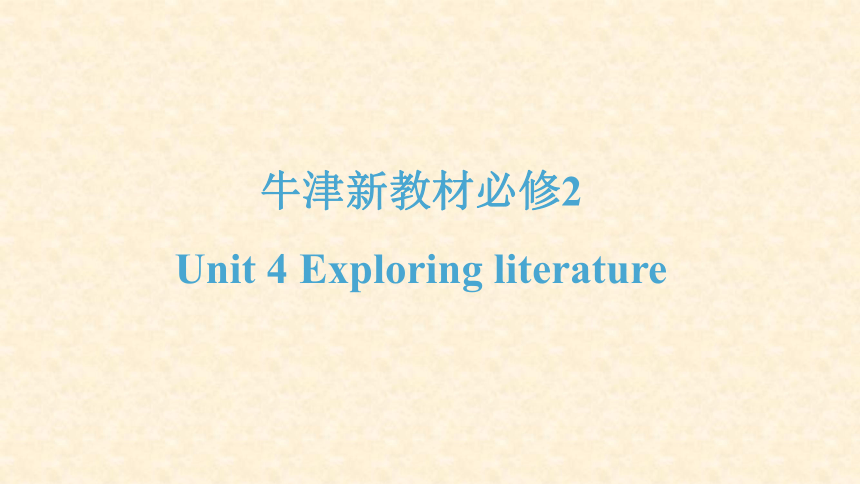 | |
| 格式 | pptx | ||
| 文件大小 | 939.2KB | ||
| 资源类型 | 教案 | ||
| 版本资源 | 牛津译林版(2019) | ||
| 科目 | 英语 | ||
| 更新时间 | 2022-09-14 16:40:57 | ||
图片预览

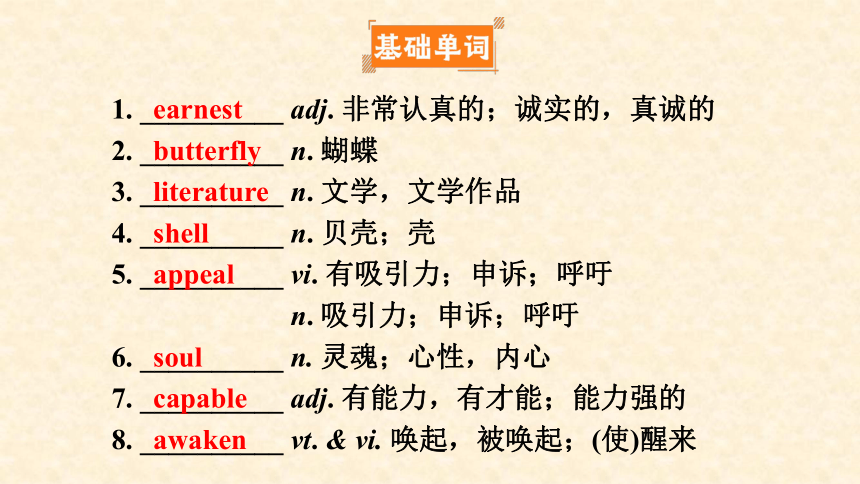
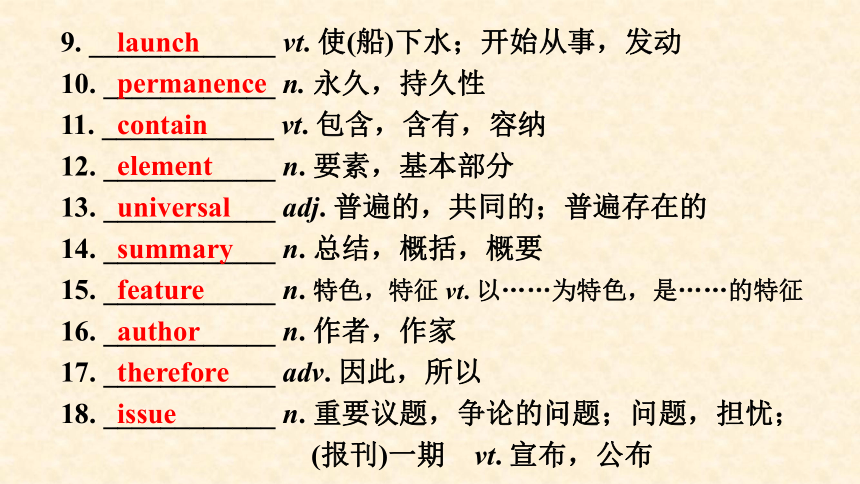
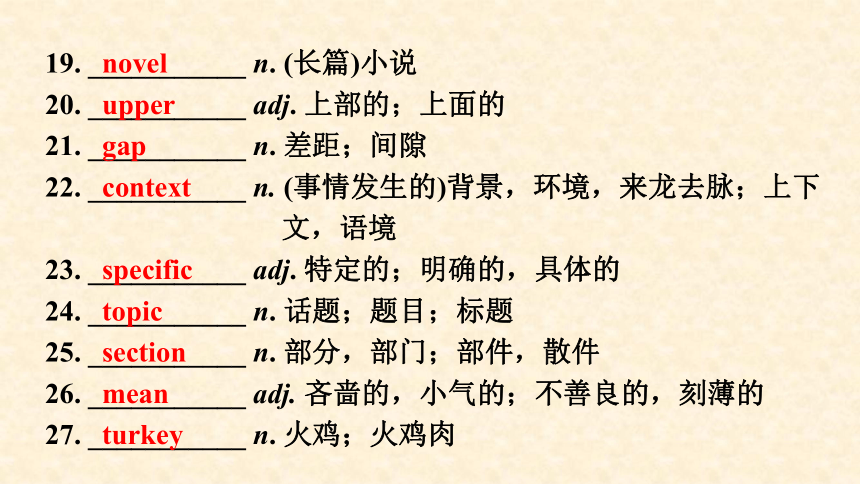
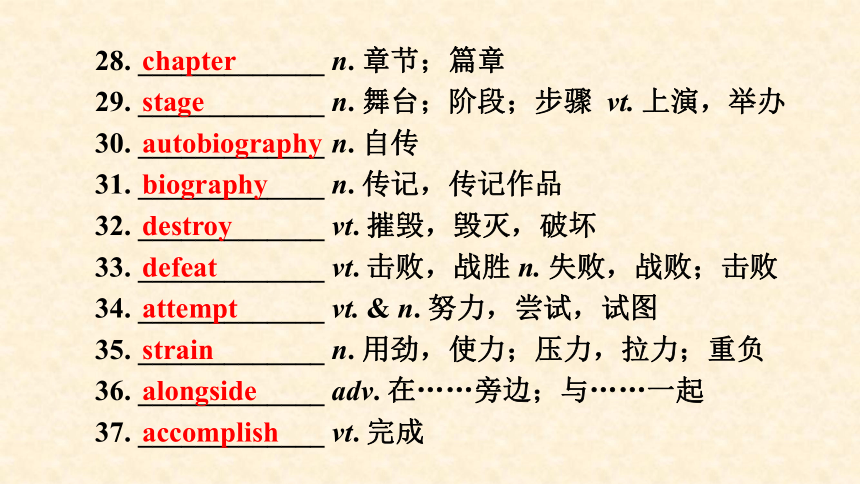
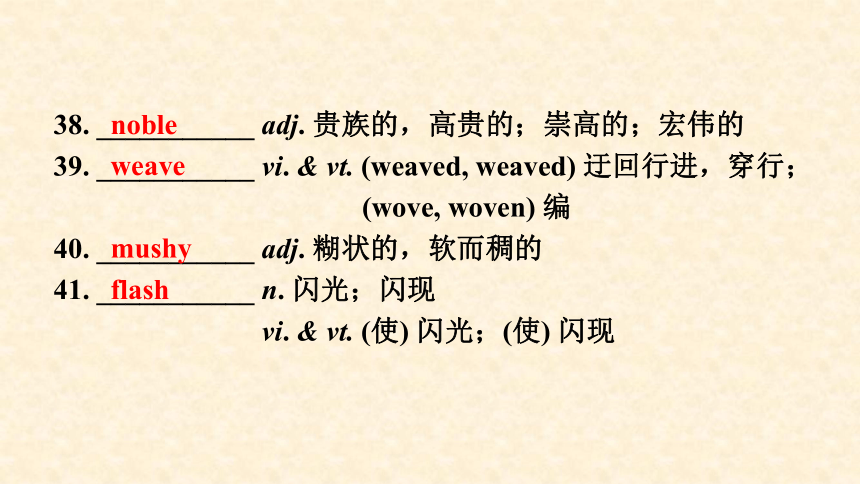
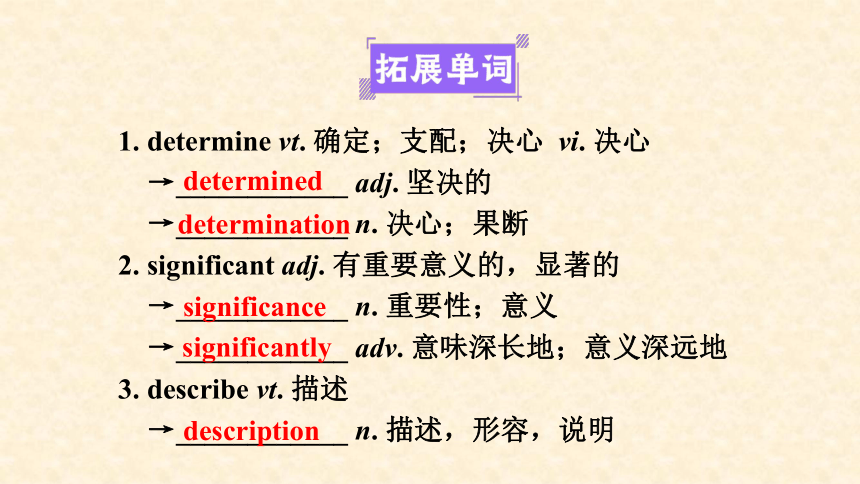
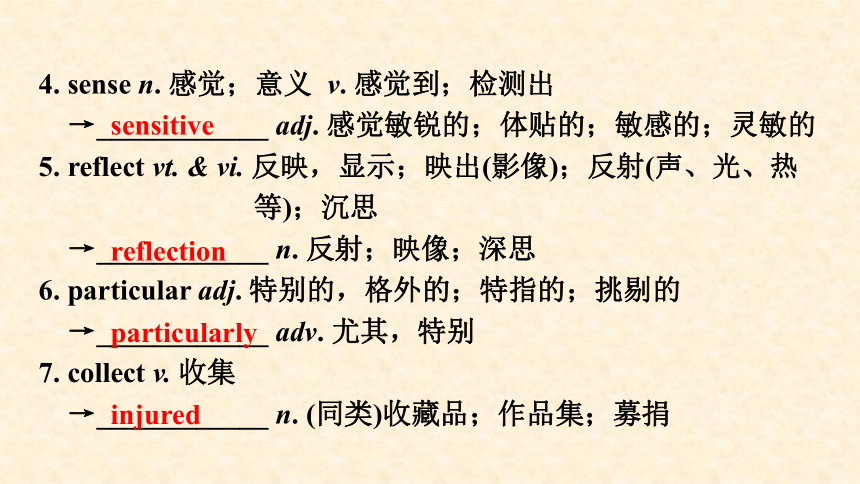
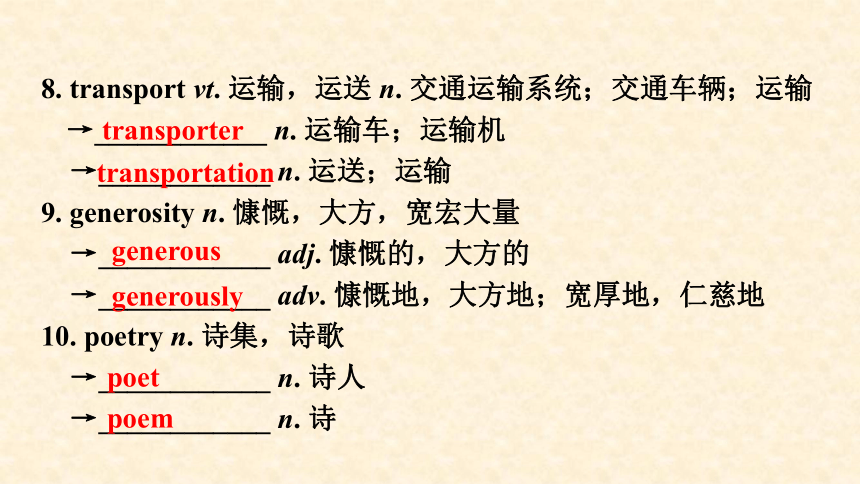
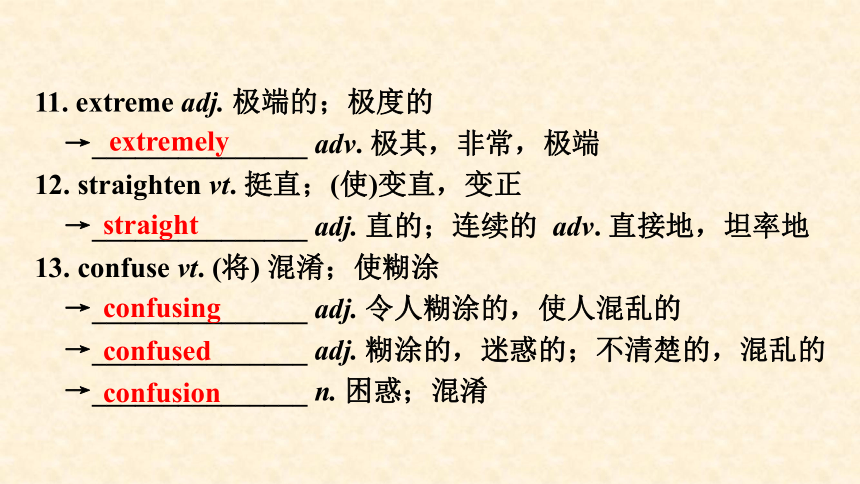
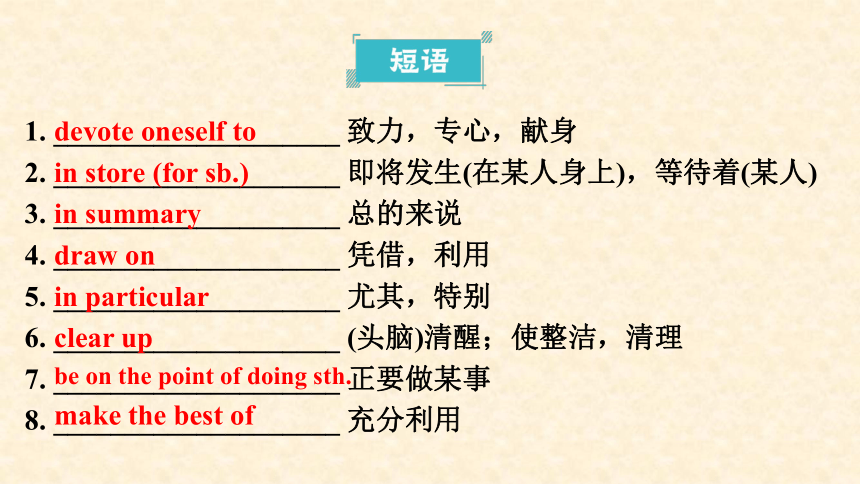
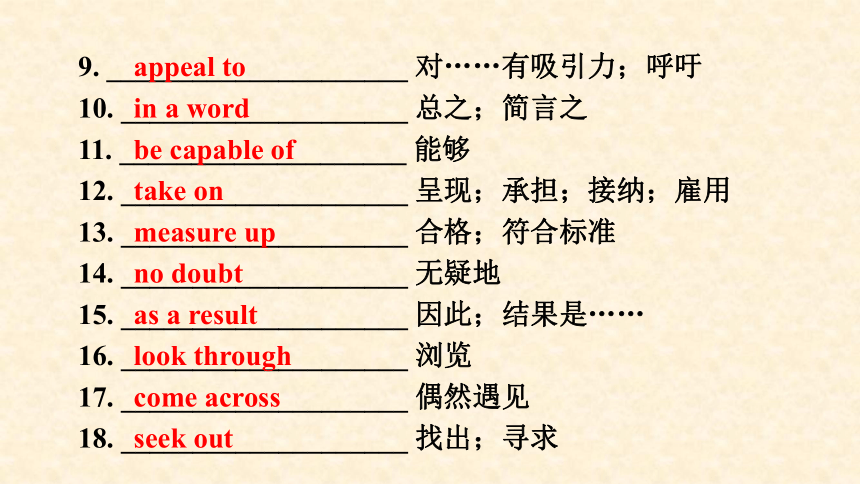
文档简介
(共65张PPT)
牛津新教材必修2
Unit 4 Exploring literature
1. __________ adj. 非常认真的;诚实的,真诚的
2. __________ n. 蝴蝶
3. __________ n. 文学,文学作品
4. __________ n. 贝壳;壳
5. __________ vi. 有吸引力;申诉;呼吁
n. 吸引力;申诉;呼吁
6. __________ n. 灵魂;心性,内心
7. __________ adj. 有能力,有才能;能力强的
8. __________ vt. & vi. 唤起,被唤起;(使)醒来
earnest
butterfly
literature
shell
appeal
soul
capable
awaken
9. _____________ vt. 使(船)下水;开始从事,发动
10. ____________ n. 永久,持久性
11. ____________ vt. 包含,含有,容纳
12. ____________ n. 要素,基本部分
13. ____________ adj. 普遍的,共同的;普遍存在的
14. ____________ n. 总结,概括,概要
15. ____________ n. 特色,特征 vt. 以……为特色,是……的特征
16. ____________ n. 作者,作家
17. ____________ adv. 因此,所以
18. ____________ n. 重要议题,争论的问题;问题,担忧;
(报刊)一期 vt. 宣布,公布
launch
permanence
contain
element
universal
summary
feature
author
therefore
issue
19. ___________ n. (长篇)小说
20. ___________ adj. 上部的;上面的
21. ___________ n. 差距;间隙
22. ___________ n. (事情发生的)背景,环境,来龙去脉;上下
文,语境
23. ___________ adj. 特定的;明确的,具体的
24. ___________ n. 话题;题目;标题
25. ___________ n. 部分,部门;部件,散件
26. ___________ adj. 吝啬的,小气的;不善良的,刻薄的
27. ___________ n. 火鸡;火鸡肉
novel
upper
gap
context
specific
topic
section
mean
turkey
28. _____________ n. 章节;篇章
29. _____________ n. 舞台;阶段;步骤 vt. 上演,举办
30. _____________ n. 自传
31. _____________ n. 传记,传记作品
32. _____________ vt. 摧毁,毁灭,破坏
33. _____________ vt. 击败,战胜 n. 失败,战败;击败
34. _____________ vt. & n. 努力,尝试,试图
35. _____________ n. 用劲,使力;压力,拉力;重负
36. _____________ adv. 在……旁边;与……一起
37. _____________ vt. 完成
chapter
stage
autobiography
biography
destroy
defeat
attempt
strain
alongside
accomplish
38. ___________ adj. 贵族的,高贵的;崇高的;宏伟的
39. ___________ vi. & vt. (weaved, weaved) 迂回行进,穿行;
(wove, woven) 编
40. ___________ adj. 糊状的,软而稠的
41. ___________ n. 闪光;闪现
vi. & vt. (使) 闪光;(使) 闪现
noble
weave
mushy
flash
1. determine vt. 确定;支配;决心 vi. 决心
→____________ adj. 坚决的
→____________ n. 决心;果断
2. significant adj. 有重要意义的,显著的
→____________ n. 重要性;意义
→____________ adv. 意味深长地;意义深远地
3. describe vt. 描述
→____________ n. 描述,形容,说明
determined
significance
significantly
description
determination
4. sense n. 感觉;意义 v. 感觉到;检测出
→____________ adj. 感觉敏锐的;体贴的;敏感的;灵敏的
5. reflect vt. & vi. 反映,显示;映出(影像);反射(声、光、热
等);沉思
→____________ n. 反射;映像;深思
6. particular adj. 特别的,格外的;特指的;挑剔的
→____________ adv. 尤其,特别
7. collect v. 收集
→____________ n. (同类)收藏品;作品集;募捐
reflection
sensitive
particularly
injured
8. transport vt. 运输,运送 n. 交通运输系统;交通车辆;运输 →____________ n. 运输车;运输机
→____________ n. 运送;运输
9. generosity n. 慷慨,大方,宽宏大量
→____________ adj. 慷慨的,大方的
→____________ adv. 慷慨地,大方地;宽厚地,仁慈地
10. poetry n. 诗集,诗歌
→____________ n. 诗人
→____________ n. 诗
transporter
generous
generously
poet
poem
transportation
11. extreme adj. 极端的;极度的
→_______________ adv. 极其,非常,极端
12. straighten vt. 挺直;(使)变直,变正
→_______________ adj. 直的;连续的 adv. 直接地,坦率地
13. confuse vt. (将) 混淆;使糊涂
→_______________ adj. 令人糊涂的,使人混乱的
→_______________ adj. 糊涂的,迷惑的;不清楚的,混乱的
→_______________ n. 困惑;混淆
extremely
straight
confusing
confused
confusion
1. ____________________ 致力,专心,献身
2. ____________________ 即将发生(在某人身上),等待着(某人)
3. ____________________ 总的来说
4. ____________________ 凭借,利用
5. ____________________ 尤其,特别
6. ____________________ (头脑)清醒;使整洁,清理
7. ____________________ 正要做某事
8. ____________________ 充分利用
devote oneself to
in store (for sb.)
in summary
draw on
in particular
clear up
be on the point of doing sth.
make the best of
9. _____________________ 对……有吸引力;呼吁
10. ____________________ 总之;简言之
11. ____________________ 能够
12. ____________________ 呈现;承担;接纳;雇用
13. ____________________ 合格;符合标准
14. ____________________ 无疑地
15. ____________________ 因此;结果是……
16. ____________________ 浏览
17. ____________________ 偶然遇见
18. ____________________ 找出;寻求
appeal to
in a word
be capable of
take on
measure up
no doubt
as a result
look through
come across
seek out
19. ____________________ 达成共识
20. ____________________ 上交
21. ____________________ 结果是……
22. ____________________ 由……组成
23. ____________________ 增加;增添
24. ____________________ 举几个例子来说
25. ____________________ 猛拉
26. ____________________ 握住不放;坚持住
27. ____________________ 完成;恢复;解决;克服
28. ____________________ 支撑;举起
agree on
hand in
turn out
(be) made up of
add to
to name a few
pull on
hold on
get over
hold on
1. In a word, we have now reached a point where we wish to enjoy and understand literature.
关系副词where引导的定语从句
2. Never have I seen a greater, or more beautiful, or a calmer or more noble thing than you, brother.
never 位于句首的倒装句
1. appeal vi. 有吸引力;申诉;呼吁 n. 吸引力;申诉;呼吁
Let a little song appeal to the ear, or a great book to the heart, and we discover a new world, a world of dreams and magic. (P44)
appeal to sb. for sth. 为……向某人呼吁或请求
appeal to sb. to do sth. 呼吁或请求某人做某事
make an appeal to sb. 向某人提出呼吁
appealing adj. 吸引人的,有感染力的;恳求的,希望同情的
【语境应用】 根据汉语意思,完成下列句子,每空一词。
1) 她的画吸引我的地方是它的色彩。
______ ______ ______ me about her painting is its colours.
2) 组织者呼吁群众不要惊慌。
The organizers _______ ______ ______ ______ ______ ______ panic.
3) 新的标题是想给这次聚会以更大的公众吸引力。
The new title was meant to give the party ______ ______ ______.
4) 她最后一次恳求父亲允准。
She ______ ______ ______ ______ ______ her father for permission.
What appeals to
appealed to the crowd not
to
greater public
appeal
made one last appeal to
2. determine vt. 确定;支配;决心 vi. 决心
The first step is to determine some of its significant qualities. (P44)
determine to do sth. (表示动作) 决心做某事,决定做某事
determine on sth. 决心/ 决定……
determined adj. 坚定的,坚决的
be determined to do sth. (表示状态)决心做某事,决意做某事
determination n. 决心,果断;坚定;决定;确定
with determination 顽强地,有决心地
【语境应用】单句语法填空。
1) ___________ (determine) to be myself, move forward, free of shame and worldly labels (世俗标签), I can now call myself a “marathon winner”.
2) Where he once felt like giving up, he now has the _____________ (determine) to push further and keep on going.
3) And the more we look, the more we will see that social factors(因素) like gender, race, and class _________________ (not determine) the appearance of genius. (2021 全国甲卷)
Determined
determination
do not determine
3. reflect vt. & vi. 反映,显示;映出(影像);反射(声、光、热等);沉思
Some truth and beauty remain unnoticed until a sensitive human soul brings them to our attention, just as the shell reflects the unnoticed sounds. (P45)
reflect ……in…… 在……中映出……的影像
be reflected in 倒映在;反映在
reflect on/upon sth. 认真思考
reflection n. 反映, 反射; 映象, 倒影
on reflection 经再三考虑,仔细考虑
【语境应用】补全句子。
1) Wear something white — it _______ _______ ________ (反射热量).
2) Your clothes are often ______ _________ _______ ______ __________ (一种你个性的反映).
3) I need time to ________ ________ ________ ________ (认真思考你的建议).
4) His behavior ________ ________ _______ ________ ________ ________ (显示了他对待工作的懒惰态度).
reflects the heat
a reflection of your personality
reflect on your advice
reflects his lazy attitude
to work
4. contain vt. 包含,含有,容纳;控制,克制,抑制
To achieve this, it should contain two elements: universal interest and personal style. (P45)
contain sth. 包含/含有某物
contain oneself 克制自己
【语境应用】根据语境猜测contain的意思。
1) How much liquid do you think this bottle contains _______________
2) She could no longer contain her anger and shouted at him uncontrollably.
____________
包含,容纳
抑制 (感情)
contain 通常指某容器中盛有、装有某物;还可指某种物质中含有某种成分。不能用于被动语态和进行时。
include 通常表示把某事物或某人作为其中的一部分包含在内,在句中常构成分词短语sth. /sb. included 或including sth./ sb.
contain, include
【语境应用】汉译英。
1) 全班四十个人中包括二十个女生。
The class of forty includes twenty girls.
2) 她考试通过了,无法抑制内心的激动。
She passed the exam and was unable to contain her excitement.
3) 垃圾食品含有很多有害物质(substance)。
Junk food contains a lot of harmful substances.
5. destroy vt. 摧毁,毁灭,破坏
He is extremely good at describing the adventures of tough men who he believes “can be destroyed but not defeated”. (P53)
destroy, damage, ruin
destroy vt. “彻底破坏”以至于不可能修复,“破坏、毁灭”,也可以指希望、计划等破灭。
damage v. & n. 部分“损坏、损害、破坏”或指使用价值有所降低。
ruin v. 使毁灭,使崩溃,弄糟 n. 毁灭,瓦解,废墟 (抽象概念) 表示严重破坏,以至于不能修复,但这种破坏不像destroy那样毁灭某物,而是强调致使该物的使用价值发生了变化。
【语境应用】选词填空(destroy, damage, ruin)
1) The building was completely ____________ by fire.
2) His car hit a tree by the roadside and was __________. So he had to have it repaired.
3) My new shoes got ________ in the mud.
destroyed
damaged
ruined
6. attempt vt. & n. 努力; 尝试; 试图
After coming in empty-handed for eighty-four days, Santiago attempts to catch a huge fish. (P53)
make an attempt to do sth. 企图做某事
in an attempt to do sth. 试图做某事
at one’s first attempt 第一次尝试
attempt to do sth. 尝试做某事,试图做某事
attempted adj. (犯罪等)未遂的
attempted murder/ suicide 谋杀/自杀未遂
【语境应用】单句语法填空。
1) I’ll attempt ___________ (answer) all your questions.
2) If you fail _____ the first attempt, there is no need to care about that.
to answer
at
一句多译。
3) 我试图让她相信他是诚实的,但是徒劳无果。(attempt)
I’ve ___________________________ her of his honesty, but in vain.
I’ve ___________________________ her of his honesty, but in vain.
attempted to convince
made an attempt to convince
7. confused adj. 糊涂的,迷惑的;不清楚的,混乱的
Now you are getting confused in the head, he thought. (P54)
be confused by/ about sth. 对……感到困惑
confuse vt. 使迷惑; 使难于理解
confusing adj. 令人困惑的;难懂的
confusion n. 困惑, 混乱;混淆
confuse A with/and B 把A和B相混淆
in confusion 困惑地;困窘地
【语境应用】根据提示完成下列句子。
1) 我被这么多的事情搞糊涂了。
I _____________ by so many things.
2) 我总是把你和你妹妹搞混—你们俩长得太像了。
I always _________________________ — you look so alike.
was confused
confuse you with your sister
用confuse的适当形式填空
1) Some of the questions he asked were very ____________.
2) In _____________ I lost my bag and wasn’t able to find it.
3) I’m totally __________. Could you explain that again
4) It’s easy to ____________ them because they’re so alike.
confusing
confusion
confused
confuse
1. devote oneself to 致力,专心,献身
My meaning simply is, that whatever I have tried to do in life, I have tried with all my heart to do well; that whatever I have devoted myself to, I have devoted myself to completely; that in great aims and in small, I have always been thoroughly in earnest. (P43)
devote vt. 致力;献身(与介词to连用)
devote one’s life/ time / money/ energy to sb. / sth. 把某人的一生/时间/金钱/精力奉献于……
devoted adj. 忠诚的;深爱的;全心全意的
be devoted to 对……忠诚;深爱……
【语境应用】翻译句子。
1) 我叔叔决定把余生献给科学研究。
2) 她欣然放弃了兼职工作,全身心地投入到艺术事业中去。
My uncle decided to devote the rest of his life to scientific study.
She gladly gave up her part-time job to devote herself entirely to her art.
2. clear up (头脑)清醒;使整洁,清理;(天气)转晴;(疾病)痊愈;
解决;解释
“Clear up, head”, he said in a voice he could hardly hear. “Clear up.” (P54)
put up 建造;举起;张贴
make up 构成;化妆;编造
take up 拿起;占据;开始从事
pick up 捡起;学会;接人
【语境应用】英译汉。
1) Adam, clear up this mess before your father sees it.
亚当,在你父亲看到之前,把这乱糟糟的东西收拾干净。
2) There are a couple of points we need to clear up before the meeting begins.
开会前,我们还需澄清几点。
3) The weather won’t clear up until the rainy seasons is over.
雨季不会结束,天气就不会放晴。
3. be on the point of doing sth. 正要做某事
He had been on the point of feeling himself go each time. (P54)
at the point of 几乎要
beside / off the point 不切正题,无关紧要
be about to do sth. when…
= be on the point of doing sth. when…
正要做某事,这时突然……
【语境应用】句型转换(每空一词)
1) The conversation broke down at that time when all of us thought it would go smoothly.
The conversation broke down ______ ______ ______ when all of us thought it would go smoothly.
2) Lucy was about to go out when it began to rain.
Lucy was ______ ______ ______ ______ ______ ______ when it began to rain.
at that point
on the point of going out
1. 关系副词where引导的定语从句
In a word, we have now reached a point where we wish to enjoy and understand literature. (P44)
关系副词where既可以引导非限制性定语从句,又可引导限制性定语从句,并在定语从句中作地点状语。
1) 先行词为具体的地点名词,如:place,city,factory等。
2) 先行词为抽象的地点名词,如:situation,condition,point,case,stage,film,activity,job等。
【语境应用】单句语法填空
1) Many countries are now setting up national parks ________ animals and plants can be protected.
2) In summary, it’s helpful to put children in a situation ________ they can see themselves differently.
where
where
先行词表示地点时并非都用where引导定语从句。若关系代词在定语从句中充当主语或宾语时,须用which或that引导定语从句。
2. never 位于句首的倒装句
Never have I seen a greater, or more beautiful, or a calmer or more noble thing than you, brother. (P50)
在英语中,当否定副词及含有否定词的介词短语置于句首时,句子需要使用部分倒装。这样的词或短语有never, neither, not, seldom, little, hardly, rarely, scarcely, at no time, by no means, in no way等。
【语境应用】 补全句子。
1) 你不能取消这个合同,我也不能。
You can’t cancel the contract, _____________________.
2) 我永远不会忘记你与我们在一起的日子。
__________________ the days when you were with us.
nor/neither can I
Never shall I forget
情态动词
1. 情态动词本身有一定的词义,通常与动词原形一起构成谓语,表示说话人的看法或主观设想。常见的情态动词有:can、could、may、might、must、ought to、shall、should、will 和 would。另外,dare、need、have to 和 used to 也具有情态动词的某些特性。
2 can 与 could
表示能力(ability),意思相当于 be able to。如:
Jack can swim.
My father could stand on his hands when he was young.
注意:在一般过去时中,was / were able to 通常表示能做并且已经做了的事,could 仅表示能力。
如:I was able to swim to the bank when the ship sank.
I could lift the heavy box.
3 must 与 need
表示必要性(necessity)。must 意为“必须”,否定式 mustn’t 意为“不许”;need 意为“需要”,否定式 needn’t 意为“不必”。如:
I must go now.
You mustn’t forget your ticket.
Need we go right now
You needn’t do it if you don’t want to.
注意:have to 也有“必须”的含义,但侧重客观需求,有时态的变化,否定式是 don’t / doesn’t have to,意为“不必”,意思相当于 needn’t。如:
We will have to think of a new plan.
You don’t have to run.
4 can、could、may 与 might
表示许可(permission)。表示许可时,may 多用于正式场合,could 和 might 的语气更委婉些。如:
You can use my pen if you like.
Students may not bring their pets to school.
Could / Might I borrow your bike
5 can、could、may 、might 与must
表示可能性(possibility)。may、might和could常用于肯定句,意为“可能”,must用于肯定句,意为“一定”;否定式may/might not意为“可能不”,can’t/couldn’t意为“不可能,肯定不”。如:
That may/might/could be a good idea.
You must be tired after the long journey.
There may not be enough money to pay for a new car.
Your story can’t/couldn’t be true.
注意:can表示可能性时,含有“有时会”的意思。如:
The temperature here can be as high as 37℃.
6 should 与 ought to
表示义务(obligation)或建议(suggestion),意为“应该”。如:
They should / ought to build more libraries.
注意:should 与 ought to 也可以表示主观判断,意思是“可能会,应该会”,相当于 will probably。如:
The rain should / ought to stop soon.
7 will 与 would
1) 表示习惯性动作(habit),will 表示现在的习惯,would 表示过去的习惯。如:
Mary will listen to music for hours in her room.
I would take a walk after supper when I was young.
2) 表示意愿(willingness)。如:
The baby won’t go to sleep.
3) 表示请求(request),would 比 will 更委婉些。如:
Would you give me some advice
注意:used to也表示过去的习惯性动作,多用于非正式场合,往往指后来停止了的动作。否定形式是 didn’t use to 或 used not to。如:
I used to have a bicycle, but I sold it.
John didn’t use to come here.
Did Mike use to read newspapers
8 shall
1) 在疑问句中,表示建议或征求意见。如:
Shall I help you with the box
2) 表示承诺或要求。如:
You shall have the magazine.
He shall do as I tell him.
3) 用于正式文件、法律、规章制度等,表示规定。如:
Students shall not use calculators during exams.
9 dare 与 need
dare 和 need 作为情态动词,常用于疑问句和否定句中。这两个词也可以用作实义动词。如:
I dare not go there alone.
I didn’t dare to say a word.
Nobody dared to ask any questions.
Need we finish the work today
You needn’t worry about it.
You don’t need to come yourself.
10 情态动词的进行式、完成式和被动式
1) 情态动词可以与主动词的进行式合用,表示某动作正在进行。如:
Jack may be reading in the library.
2) 情态动词可以与主动词的完成式合用,表示过去发生的动作。如:
Tom must have arrived home by now.
You can’t have seen Henry yesterday because he was in London.
3) 情态动词可以与主动词的被动式合用。如:
The road may be blocked.
1. Jim says we ______ stay in his house as long as we leave it clean and tidy. (2020年天津卷单项填空)
A. must B. can C. need D. should
B
2. The professor warned the students that on no account _______ use mobile phones in his class. (2019年天津卷单项填空)
A. should they B. they should
C. dare they D. they dare
A
3. In today’s information age, the loss of data ________ cause serious problems for a company. (2018年北京卷单项填空)
A. need B. should
C. can D. must
C
如何用英语推荐文学作品
写作任务
假定你是李华,在某对外汉语教学平台当助教。你的学生Aria发来一封邮件,想请你推荐一部中国文学作品。请你给她回复一封邮件,要点包括:
1. 推荐的书名以及推荐理由; 2. 希望能对她有所帮助。
注意:
1. 词数100左右(开头和结尾已给出,但不计入总词数);
2. 可以适当增加细节,以使行文连贯。
Dear Aria,
________________________________________________________________________________________________________________________________________________________________________________________________________________________
Yours,
Li Hua
一、审题定调
本写作任务要求写一封推荐信,为学生Aria推荐一部中国文学作品,并说明理由,属于应用文。推荐信的目的是向收信人推荐人或者物品,希望对方予以接受或者接纳,所以推荐的理由要合理且具有说服力。推荐信的人称以第一、三人称为主。
二、谋篇布局
根据提示,我们可将本写作任务的正文分为三部分:
第一部分:说明写信目的(提出推荐的书名);
第二部分:说明推荐理由;
第三部分:希望能对她有所帮助。
三、组织语言
第一部分:说明写信目的(提出推荐的书名)。
普通表达 高级表达
I'm glad to know that you are interested in ... I'd like to recommend ... to you. Knowing that ... appeals to you, I am more than willing to recommend to you ... written by ...
第二部分:说明推荐理由。
普通表达 高级表达
●... tells the story of ... ●The plot is so attractive / interesting / amazing that ... becomes ... ●Besides, ... gains international fame and won ... ●..., relating the story of ..., is considered to be ... thanks to its fascinating / incredible / engaging plot.
●... was awarded ..., and it has become a household name (家喻户晓的名字) both at home and abroad.
●I believe you won't be able to put ... down after you start reading ... ●..., I believe, will have a strong attraction for you as long as you start reading ...
第三部分:希望能对她有所帮助。
普通表达 高级表达
●Hopefully you will find ... very helpful in ... ●I'm so confident that you will find ... to be helpful. ●I sincerely hope that ... will excite your interest in ...
●I'm convinced that ... will contribute to ...
Dear Aria,
Knowing that Chinese literature appeals to you, I am more than willing to recommend to you The Three-Body Problem written by Liu Cixin.
This book, relating the story of the communication and fight between Earth and the three-body civilization, is considered to be one of the most popular science fiction books in China thanks to its fascinating plot.
The book was awarded the Hugo Award for Best Novel in 2015, and it has become a household name both at home and abroad. The Three-Body Problem, I believe, will have a strong attraction for you as long as you start reading it.
I sincerely hope that The Three-Body Problem will excite your interest in studying Chinese literature.
Yours,
Li Hua
牛津新教材必修2
Unit 4 Exploring literature
1. __________ adj. 非常认真的;诚实的,真诚的
2. __________ n. 蝴蝶
3. __________ n. 文学,文学作品
4. __________ n. 贝壳;壳
5. __________ vi. 有吸引力;申诉;呼吁
n. 吸引力;申诉;呼吁
6. __________ n. 灵魂;心性,内心
7. __________ adj. 有能力,有才能;能力强的
8. __________ vt. & vi. 唤起,被唤起;(使)醒来
earnest
butterfly
literature
shell
appeal
soul
capable
awaken
9. _____________ vt. 使(船)下水;开始从事,发动
10. ____________ n. 永久,持久性
11. ____________ vt. 包含,含有,容纳
12. ____________ n. 要素,基本部分
13. ____________ adj. 普遍的,共同的;普遍存在的
14. ____________ n. 总结,概括,概要
15. ____________ n. 特色,特征 vt. 以……为特色,是……的特征
16. ____________ n. 作者,作家
17. ____________ adv. 因此,所以
18. ____________ n. 重要议题,争论的问题;问题,担忧;
(报刊)一期 vt. 宣布,公布
launch
permanence
contain
element
universal
summary
feature
author
therefore
issue
19. ___________ n. (长篇)小说
20. ___________ adj. 上部的;上面的
21. ___________ n. 差距;间隙
22. ___________ n. (事情发生的)背景,环境,来龙去脉;上下
文,语境
23. ___________ adj. 特定的;明确的,具体的
24. ___________ n. 话题;题目;标题
25. ___________ n. 部分,部门;部件,散件
26. ___________ adj. 吝啬的,小气的;不善良的,刻薄的
27. ___________ n. 火鸡;火鸡肉
novel
upper
gap
context
specific
topic
section
mean
turkey
28. _____________ n. 章节;篇章
29. _____________ n. 舞台;阶段;步骤 vt. 上演,举办
30. _____________ n. 自传
31. _____________ n. 传记,传记作品
32. _____________ vt. 摧毁,毁灭,破坏
33. _____________ vt. 击败,战胜 n. 失败,战败;击败
34. _____________ vt. & n. 努力,尝试,试图
35. _____________ n. 用劲,使力;压力,拉力;重负
36. _____________ adv. 在……旁边;与……一起
37. _____________ vt. 完成
chapter
stage
autobiography
biography
destroy
defeat
attempt
strain
alongside
accomplish
38. ___________ adj. 贵族的,高贵的;崇高的;宏伟的
39. ___________ vi. & vt. (weaved, weaved) 迂回行进,穿行;
(wove, woven) 编
40. ___________ adj. 糊状的,软而稠的
41. ___________ n. 闪光;闪现
vi. & vt. (使) 闪光;(使) 闪现
noble
weave
mushy
flash
1. determine vt. 确定;支配;决心 vi. 决心
→____________ adj. 坚决的
→____________ n. 决心;果断
2. significant adj. 有重要意义的,显著的
→____________ n. 重要性;意义
→____________ adv. 意味深长地;意义深远地
3. describe vt. 描述
→____________ n. 描述,形容,说明
determined
significance
significantly
description
determination
4. sense n. 感觉;意义 v. 感觉到;检测出
→____________ adj. 感觉敏锐的;体贴的;敏感的;灵敏的
5. reflect vt. & vi. 反映,显示;映出(影像);反射(声、光、热
等);沉思
→____________ n. 反射;映像;深思
6. particular adj. 特别的,格外的;特指的;挑剔的
→____________ adv. 尤其,特别
7. collect v. 收集
→____________ n. (同类)收藏品;作品集;募捐
reflection
sensitive
particularly
injured
8. transport vt. 运输,运送 n. 交通运输系统;交通车辆;运输 →____________ n. 运输车;运输机
→____________ n. 运送;运输
9. generosity n. 慷慨,大方,宽宏大量
→____________ adj. 慷慨的,大方的
→____________ adv. 慷慨地,大方地;宽厚地,仁慈地
10. poetry n. 诗集,诗歌
→____________ n. 诗人
→____________ n. 诗
transporter
generous
generously
poet
poem
transportation
11. extreme adj. 极端的;极度的
→_______________ adv. 极其,非常,极端
12. straighten vt. 挺直;(使)变直,变正
→_______________ adj. 直的;连续的 adv. 直接地,坦率地
13. confuse vt. (将) 混淆;使糊涂
→_______________ adj. 令人糊涂的,使人混乱的
→_______________ adj. 糊涂的,迷惑的;不清楚的,混乱的
→_______________ n. 困惑;混淆
extremely
straight
confusing
confused
confusion
1. ____________________ 致力,专心,献身
2. ____________________ 即将发生(在某人身上),等待着(某人)
3. ____________________ 总的来说
4. ____________________ 凭借,利用
5. ____________________ 尤其,特别
6. ____________________ (头脑)清醒;使整洁,清理
7. ____________________ 正要做某事
8. ____________________ 充分利用
devote oneself to
in store (for sb.)
in summary
draw on
in particular
clear up
be on the point of doing sth.
make the best of
9. _____________________ 对……有吸引力;呼吁
10. ____________________ 总之;简言之
11. ____________________ 能够
12. ____________________ 呈现;承担;接纳;雇用
13. ____________________ 合格;符合标准
14. ____________________ 无疑地
15. ____________________ 因此;结果是……
16. ____________________ 浏览
17. ____________________ 偶然遇见
18. ____________________ 找出;寻求
appeal to
in a word
be capable of
take on
measure up
no doubt
as a result
look through
come across
seek out
19. ____________________ 达成共识
20. ____________________ 上交
21. ____________________ 结果是……
22. ____________________ 由……组成
23. ____________________ 增加;增添
24. ____________________ 举几个例子来说
25. ____________________ 猛拉
26. ____________________ 握住不放;坚持住
27. ____________________ 完成;恢复;解决;克服
28. ____________________ 支撑;举起
agree on
hand in
turn out
(be) made up of
add to
to name a few
pull on
hold on
get over
hold on
1. In a word, we have now reached a point where we wish to enjoy and understand literature.
关系副词where引导的定语从句
2. Never have I seen a greater, or more beautiful, or a calmer or more noble thing than you, brother.
never 位于句首的倒装句
1. appeal vi. 有吸引力;申诉;呼吁 n. 吸引力;申诉;呼吁
Let a little song appeal to the ear, or a great book to the heart, and we discover a new world, a world of dreams and magic. (P44)
appeal to sb. for sth. 为……向某人呼吁或请求
appeal to sb. to do sth. 呼吁或请求某人做某事
make an appeal to sb. 向某人提出呼吁
appealing adj. 吸引人的,有感染力的;恳求的,希望同情的
【语境应用】 根据汉语意思,完成下列句子,每空一词。
1) 她的画吸引我的地方是它的色彩。
______ ______ ______ me about her painting is its colours.
2) 组织者呼吁群众不要惊慌。
The organizers _______ ______ ______ ______ ______ ______ panic.
3) 新的标题是想给这次聚会以更大的公众吸引力。
The new title was meant to give the party ______ ______ ______.
4) 她最后一次恳求父亲允准。
She ______ ______ ______ ______ ______ her father for permission.
What appeals to
appealed to the crowd not
to
greater public
appeal
made one last appeal to
2. determine vt. 确定;支配;决心 vi. 决心
The first step is to determine some of its significant qualities. (P44)
determine to do sth. (表示动作) 决心做某事,决定做某事
determine on sth. 决心/ 决定……
determined adj. 坚定的,坚决的
be determined to do sth. (表示状态)决心做某事,决意做某事
determination n. 决心,果断;坚定;决定;确定
with determination 顽强地,有决心地
【语境应用】单句语法填空。
1) ___________ (determine) to be myself, move forward, free of shame and worldly labels (世俗标签), I can now call myself a “marathon winner”.
2) Where he once felt like giving up, he now has the _____________ (determine) to push further and keep on going.
3) And the more we look, the more we will see that social factors(因素) like gender, race, and class _________________ (not determine) the appearance of genius. (2021 全国甲卷)
Determined
determination
do not determine
3. reflect vt. & vi. 反映,显示;映出(影像);反射(声、光、热等);沉思
Some truth and beauty remain unnoticed until a sensitive human soul brings them to our attention, just as the shell reflects the unnoticed sounds. (P45)
reflect ……in…… 在……中映出……的影像
be reflected in 倒映在;反映在
reflect on/upon sth. 认真思考
reflection n. 反映, 反射; 映象, 倒影
on reflection 经再三考虑,仔细考虑
【语境应用】补全句子。
1) Wear something white — it _______ _______ ________ (反射热量).
2) Your clothes are often ______ _________ _______ ______ __________ (一种你个性的反映).
3) I need time to ________ ________ ________ ________ (认真思考你的建议).
4) His behavior ________ ________ _______ ________ ________ ________ (显示了他对待工作的懒惰态度).
reflects the heat
a reflection of your personality
reflect on your advice
reflects his lazy attitude
to work
4. contain vt. 包含,含有,容纳;控制,克制,抑制
To achieve this, it should contain two elements: universal interest and personal style. (P45)
contain sth. 包含/含有某物
contain oneself 克制自己
【语境应用】根据语境猜测contain的意思。
1) How much liquid do you think this bottle contains _______________
2) She could no longer contain her anger and shouted at him uncontrollably.
____________
包含,容纳
抑制 (感情)
contain 通常指某容器中盛有、装有某物;还可指某种物质中含有某种成分。不能用于被动语态和进行时。
include 通常表示把某事物或某人作为其中的一部分包含在内,在句中常构成分词短语sth. /sb. included 或including sth./ sb.
contain, include
【语境应用】汉译英。
1) 全班四十个人中包括二十个女生。
The class of forty includes twenty girls.
2) 她考试通过了,无法抑制内心的激动。
She passed the exam and was unable to contain her excitement.
3) 垃圾食品含有很多有害物质(substance)。
Junk food contains a lot of harmful substances.
5. destroy vt. 摧毁,毁灭,破坏
He is extremely good at describing the adventures of tough men who he believes “can be destroyed but not defeated”. (P53)
destroy, damage, ruin
destroy vt. “彻底破坏”以至于不可能修复,“破坏、毁灭”,也可以指希望、计划等破灭。
damage v. & n. 部分“损坏、损害、破坏”或指使用价值有所降低。
ruin v. 使毁灭,使崩溃,弄糟 n. 毁灭,瓦解,废墟 (抽象概念) 表示严重破坏,以至于不能修复,但这种破坏不像destroy那样毁灭某物,而是强调致使该物的使用价值发生了变化。
【语境应用】选词填空(destroy, damage, ruin)
1) The building was completely ____________ by fire.
2) His car hit a tree by the roadside and was __________. So he had to have it repaired.
3) My new shoes got ________ in the mud.
destroyed
damaged
ruined
6. attempt vt. & n. 努力; 尝试; 试图
After coming in empty-handed for eighty-four days, Santiago attempts to catch a huge fish. (P53)
make an attempt to do sth. 企图做某事
in an attempt to do sth. 试图做某事
at one’s first attempt 第一次尝试
attempt to do sth. 尝试做某事,试图做某事
attempted adj. (犯罪等)未遂的
attempted murder/ suicide 谋杀/自杀未遂
【语境应用】单句语法填空。
1) I’ll attempt ___________ (answer) all your questions.
2) If you fail _____ the first attempt, there is no need to care about that.
to answer
at
一句多译。
3) 我试图让她相信他是诚实的,但是徒劳无果。(attempt)
I’ve ___________________________ her of his honesty, but in vain.
I’ve ___________________________ her of his honesty, but in vain.
attempted to convince
made an attempt to convince
7. confused adj. 糊涂的,迷惑的;不清楚的,混乱的
Now you are getting confused in the head, he thought. (P54)
be confused by/ about sth. 对……感到困惑
confuse vt. 使迷惑; 使难于理解
confusing adj. 令人困惑的;难懂的
confusion n. 困惑, 混乱;混淆
confuse A with/and B 把A和B相混淆
in confusion 困惑地;困窘地
【语境应用】根据提示完成下列句子。
1) 我被这么多的事情搞糊涂了。
I _____________ by so many things.
2) 我总是把你和你妹妹搞混—你们俩长得太像了。
I always _________________________ — you look so alike.
was confused
confuse you with your sister
用confuse的适当形式填空
1) Some of the questions he asked were very ____________.
2) In _____________ I lost my bag and wasn’t able to find it.
3) I’m totally __________. Could you explain that again
4) It’s easy to ____________ them because they’re so alike.
confusing
confusion
confused
confuse
1. devote oneself to 致力,专心,献身
My meaning simply is, that whatever I have tried to do in life, I have tried with all my heart to do well; that whatever I have devoted myself to, I have devoted myself to completely; that in great aims and in small, I have always been thoroughly in earnest. (P43)
devote vt. 致力;献身(与介词to连用)
devote one’s life/ time / money/ energy to sb. / sth. 把某人的一生/时间/金钱/精力奉献于……
devoted adj. 忠诚的;深爱的;全心全意的
be devoted to 对……忠诚;深爱……
【语境应用】翻译句子。
1) 我叔叔决定把余生献给科学研究。
2) 她欣然放弃了兼职工作,全身心地投入到艺术事业中去。
My uncle decided to devote the rest of his life to scientific study.
She gladly gave up her part-time job to devote herself entirely to her art.
2. clear up (头脑)清醒;使整洁,清理;(天气)转晴;(疾病)痊愈;
解决;解释
“Clear up, head”, he said in a voice he could hardly hear. “Clear up.” (P54)
put up 建造;举起;张贴
make up 构成;化妆;编造
take up 拿起;占据;开始从事
pick up 捡起;学会;接人
【语境应用】英译汉。
1) Adam, clear up this mess before your father sees it.
亚当,在你父亲看到之前,把这乱糟糟的东西收拾干净。
2) There are a couple of points we need to clear up before the meeting begins.
开会前,我们还需澄清几点。
3) The weather won’t clear up until the rainy seasons is over.
雨季不会结束,天气就不会放晴。
3. be on the point of doing sth. 正要做某事
He had been on the point of feeling himself go each time. (P54)
at the point of 几乎要
beside / off the point 不切正题,无关紧要
be about to do sth. when…
= be on the point of doing sth. when…
正要做某事,这时突然……
【语境应用】句型转换(每空一词)
1) The conversation broke down at that time when all of us thought it would go smoothly.
The conversation broke down ______ ______ ______ when all of us thought it would go smoothly.
2) Lucy was about to go out when it began to rain.
Lucy was ______ ______ ______ ______ ______ ______ when it began to rain.
at that point
on the point of going out
1. 关系副词where引导的定语从句
In a word, we have now reached a point where we wish to enjoy and understand literature. (P44)
关系副词where既可以引导非限制性定语从句,又可引导限制性定语从句,并在定语从句中作地点状语。
1) 先行词为具体的地点名词,如:place,city,factory等。
2) 先行词为抽象的地点名词,如:situation,condition,point,case,stage,film,activity,job等。
【语境应用】单句语法填空
1) Many countries are now setting up national parks ________ animals and plants can be protected.
2) In summary, it’s helpful to put children in a situation ________ they can see themselves differently.
where
where
先行词表示地点时并非都用where引导定语从句。若关系代词在定语从句中充当主语或宾语时,须用which或that引导定语从句。
2. never 位于句首的倒装句
Never have I seen a greater, or more beautiful, or a calmer or more noble thing than you, brother. (P50)
在英语中,当否定副词及含有否定词的介词短语置于句首时,句子需要使用部分倒装。这样的词或短语有never, neither, not, seldom, little, hardly, rarely, scarcely, at no time, by no means, in no way等。
【语境应用】 补全句子。
1) 你不能取消这个合同,我也不能。
You can’t cancel the contract, _____________________.
2) 我永远不会忘记你与我们在一起的日子。
__________________ the days when you were with us.
nor/neither can I
Never shall I forget
情态动词
1. 情态动词本身有一定的词义,通常与动词原形一起构成谓语,表示说话人的看法或主观设想。常见的情态动词有:can、could、may、might、must、ought to、shall、should、will 和 would。另外,dare、need、have to 和 used to 也具有情态动词的某些特性。
2 can 与 could
表示能力(ability),意思相当于 be able to。如:
Jack can swim.
My father could stand on his hands when he was young.
注意:在一般过去时中,was / were able to 通常表示能做并且已经做了的事,could 仅表示能力。
如:I was able to swim to the bank when the ship sank.
I could lift the heavy box.
3 must 与 need
表示必要性(necessity)。must 意为“必须”,否定式 mustn’t 意为“不许”;need 意为“需要”,否定式 needn’t 意为“不必”。如:
I must go now.
You mustn’t forget your ticket.
Need we go right now
You needn’t do it if you don’t want to.
注意:have to 也有“必须”的含义,但侧重客观需求,有时态的变化,否定式是 don’t / doesn’t have to,意为“不必”,意思相当于 needn’t。如:
We will have to think of a new plan.
You don’t have to run.
4 can、could、may 与 might
表示许可(permission)。表示许可时,may 多用于正式场合,could 和 might 的语气更委婉些。如:
You can use my pen if you like.
Students may not bring their pets to school.
Could / Might I borrow your bike
5 can、could、may 、might 与must
表示可能性(possibility)。may、might和could常用于肯定句,意为“可能”,must用于肯定句,意为“一定”;否定式may/might not意为“可能不”,can’t/couldn’t意为“不可能,肯定不”。如:
That may/might/could be a good idea.
You must be tired after the long journey.
There may not be enough money to pay for a new car.
Your story can’t/couldn’t be true.
注意:can表示可能性时,含有“有时会”的意思。如:
The temperature here can be as high as 37℃.
6 should 与 ought to
表示义务(obligation)或建议(suggestion),意为“应该”。如:
They should / ought to build more libraries.
注意:should 与 ought to 也可以表示主观判断,意思是“可能会,应该会”,相当于 will probably。如:
The rain should / ought to stop soon.
7 will 与 would
1) 表示习惯性动作(habit),will 表示现在的习惯,would 表示过去的习惯。如:
Mary will listen to music for hours in her room.
I would take a walk after supper when I was young.
2) 表示意愿(willingness)。如:
The baby won’t go to sleep.
3) 表示请求(request),would 比 will 更委婉些。如:
Would you give me some advice
注意:used to也表示过去的习惯性动作,多用于非正式场合,往往指后来停止了的动作。否定形式是 didn’t use to 或 used not to。如:
I used to have a bicycle, but I sold it.
John didn’t use to come here.
Did Mike use to read newspapers
8 shall
1) 在疑问句中,表示建议或征求意见。如:
Shall I help you with the box
2) 表示承诺或要求。如:
You shall have the magazine.
He shall do as I tell him.
3) 用于正式文件、法律、规章制度等,表示规定。如:
Students shall not use calculators during exams.
9 dare 与 need
dare 和 need 作为情态动词,常用于疑问句和否定句中。这两个词也可以用作实义动词。如:
I dare not go there alone.
I didn’t dare to say a word.
Nobody dared to ask any questions.
Need we finish the work today
You needn’t worry about it.
You don’t need to come yourself.
10 情态动词的进行式、完成式和被动式
1) 情态动词可以与主动词的进行式合用,表示某动作正在进行。如:
Jack may be reading in the library.
2) 情态动词可以与主动词的完成式合用,表示过去发生的动作。如:
Tom must have arrived home by now.
You can’t have seen Henry yesterday because he was in London.
3) 情态动词可以与主动词的被动式合用。如:
The road may be blocked.
1. Jim says we ______ stay in his house as long as we leave it clean and tidy. (2020年天津卷单项填空)
A. must B. can C. need D. should
B
2. The professor warned the students that on no account _______ use mobile phones in his class. (2019年天津卷单项填空)
A. should they B. they should
C. dare they D. they dare
A
3. In today’s information age, the loss of data ________ cause serious problems for a company. (2018年北京卷单项填空)
A. need B. should
C. can D. must
C
如何用英语推荐文学作品
写作任务
假定你是李华,在某对外汉语教学平台当助教。你的学生Aria发来一封邮件,想请你推荐一部中国文学作品。请你给她回复一封邮件,要点包括:
1. 推荐的书名以及推荐理由; 2. 希望能对她有所帮助。
注意:
1. 词数100左右(开头和结尾已给出,但不计入总词数);
2. 可以适当增加细节,以使行文连贯。
Dear Aria,
________________________________________________________________________________________________________________________________________________________________________________________________________________________
Yours,
Li Hua
一、审题定调
本写作任务要求写一封推荐信,为学生Aria推荐一部中国文学作品,并说明理由,属于应用文。推荐信的目的是向收信人推荐人或者物品,希望对方予以接受或者接纳,所以推荐的理由要合理且具有说服力。推荐信的人称以第一、三人称为主。
二、谋篇布局
根据提示,我们可将本写作任务的正文分为三部分:
第一部分:说明写信目的(提出推荐的书名);
第二部分:说明推荐理由;
第三部分:希望能对她有所帮助。
三、组织语言
第一部分:说明写信目的(提出推荐的书名)。
普通表达 高级表达
I'm glad to know that you are interested in ... I'd like to recommend ... to you. Knowing that ... appeals to you, I am more than willing to recommend to you ... written by ...
第二部分:说明推荐理由。
普通表达 高级表达
●... tells the story of ... ●The plot is so attractive / interesting / amazing that ... becomes ... ●Besides, ... gains international fame and won ... ●..., relating the story of ..., is considered to be ... thanks to its fascinating / incredible / engaging plot.
●... was awarded ..., and it has become a household name (家喻户晓的名字) both at home and abroad.
●I believe you won't be able to put ... down after you start reading ... ●..., I believe, will have a strong attraction for you as long as you start reading ...
第三部分:希望能对她有所帮助。
普通表达 高级表达
●Hopefully you will find ... very helpful in ... ●I'm so confident that you will find ... to be helpful. ●I sincerely hope that ... will excite your interest in ...
●I'm convinced that ... will contribute to ...
Dear Aria,
Knowing that Chinese literature appeals to you, I am more than willing to recommend to you The Three-Body Problem written by Liu Cixin.
This book, relating the story of the communication and fight between Earth and the three-body civilization, is considered to be one of the most popular science fiction books in China thanks to its fascinating plot.
The book was awarded the Hugo Award for Best Novel in 2015, and it has become a household name both at home and abroad. The Three-Body Problem, I believe, will have a strong attraction for you as long as you start reading it.
I sincerely hope that The Three-Body Problem will excite your interest in studying Chinese literature.
Yours,
Li Hua
